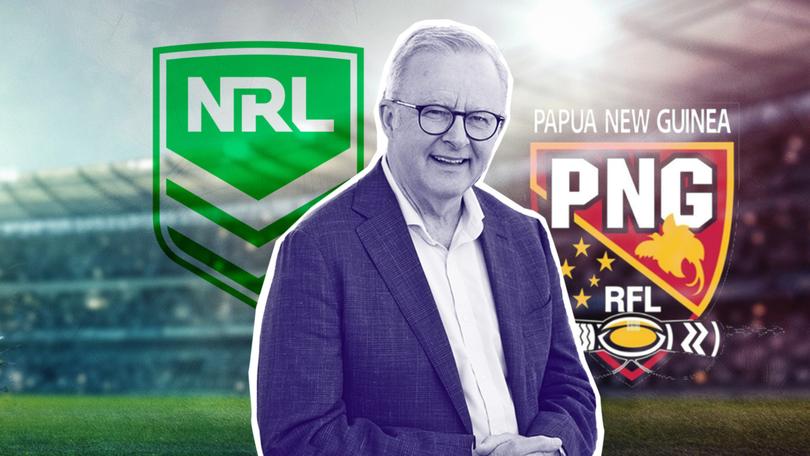Papua New Guinea NRL team funding can be withdrawn at any time in move to nullify China influence
The Australian Government has inserted a key clause in the funding package for our nearest neighbour to further keep China at bay in the Pacific, as Aussies welcome the country to the NRL.

The Australian government’s $600 million funding package for an NRL team in Papua New Guinea over the next decade can be withdrawn at any time in a strategic move to further isolate China in the region.
Prime Minister Anthony Albanese and PNG PM James Marape today officially announced the Pacific nation would be the NRL’s 18th team and enter the competition in 2028.
Mr Albanese said the deal underpinned the “strategic trust” between the two countries as PNG makes Australia its “security partner of choice.”
Sign up to The Nightly's newsletters.
Get the first look at the digital newspaper, curated daily stories and breaking headlines delivered to your inbox.
By continuing you agree to our Terms and Privacy Policy.An unpublished second agreement commits PNG to keeping Australia as its primary policing and security partner.
PNG Foreign Minister Justin Tkachenko has ruled out entering a security agreement with China as Beijing works to gain a foothold in the Pacific after signing a policing agreement with the Solomon Islands.
Details of the deal remain vague after a similar one was signed between Australia and Nauru.
That agreement locked China out of Nauru by giving Canberra an effective veto on the tiny Pacific nation entering into security arrangements with a third country in exchange for $140 million in budget and policing support.
Third countries like China could still provide funding and help for infrastructure such as roads in Nauru but the full parameters of the PNG agreement aren’t being made public.
Thursday’s announcement came on the same day a separate Australia-PNG security agreement came into force.
The pact commits both nations to maintain and strengthen co-operation in defence, policing, national security, climate change and disaster relief.
Mr Albanese defended the deal’s text being kept secret.
“It’s certainly not a secret that our relationship is so strong, that we work together and part of that working together is because of our common values,” he said.
Mr Marape noted the bilateral security agreement that came into effect on Thursday was signed before the NRL commitment.
This showed it was in his country’s interest “to have synergy with compatible police and compatible military” to tackle security challenges in both nations and the broader region, he said.
“It is strategic for us, we made this deliberate choice to have Australia as a security partner of choice in the first instance,” he said.
The agreement didn’t preclude relations with other countries and China would remain a strong trading partner but security arrangements needed to be unique with countries PNG shared borders with, Mr Marape said.
There is no guarantee of funding after 10 years, and it is unclear what intervention the government will make if the franchise can’t sustain itself financially.
The government is hoping the team will work as a bulwark against Chinese influence, which has poured billions of dollars into PNG through its Belt and Road initiatives, helping fund infrastructure developments at airports and ports.
Mr Albanese would not detail what guarantees it had asked of PNG regarding China and the NRL deal.
The NRL is also a big winner out of the deal, with it getting a $60m licence fee, while $290m will go to the franchise itself, and $250m will go towards growing the game in PNG and fostering Pacific competitions.
Despite the widespread lawlessness in the country, a government source said they were confident the PNG government could ensure the security of Australian players who opt to join the new venture. The players will earn tax-free income in bid to entice them north.
Mr Albanese said the NRL team would have major implications for Papua New Guineans, where the sport was a religion.
“A Papua New Guinea NRL team is a game-changer for Australia’s relationship with PNG and a unifying force – no two countries have a greater passion for rugby league,” he said.
“Australia’s relationship with the Pacific is profoundly important, and our sporting ties are unique.
“Partnering on rugby league is a genuine and powerful way of building lasting ties between our peoples, and ensuring long-term development, social and economic outcomes for PNG and the Pacific.”
Mr Marape said the PNG team would be striving for early success and was not just there to “make up the numbers” but wanted to win a title.
“This one team will be for one people, one country, one nation, a national unifier,” he said.
“We deeply appreciate our relationship with Australia. While government-to-government ties are important, at the heart and soul of this relationship must be people-to-people connections. Sport has the unique power to unite our two peoples, who share an ancient history and even the same DNA, as seen in the bond between Papua New Guineans and Torres Strait Islanders.
“An NRL team for PNG is more than just sports – it is a national unification strategy. With our diverse cultures and people, rugby league can bring us together as one nation. At the same time, it strengthens the shared history and people-to-people links between PNG and Australia.
“For us, this partnership is not only about rugby league but also about anchoring the deep connection between our two countries. Sport is a powerful tool to solidify and celebrate this relationship, creating a bridge that connects our communities on a personal and cultural level.
“As we look to our 50th anniversary of independence, we envision a future where a PNG NRL team represents not just sporting excellence but the enduring partnership and shared destiny between PNG and Australia. This is more than a game – it is a symbol of unity and mutual respect.”
With AAP
